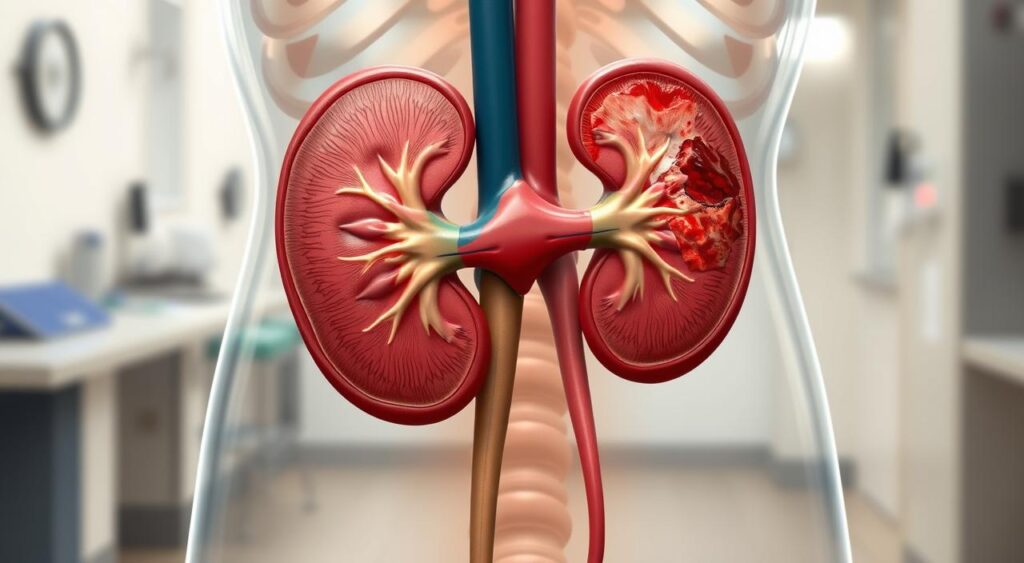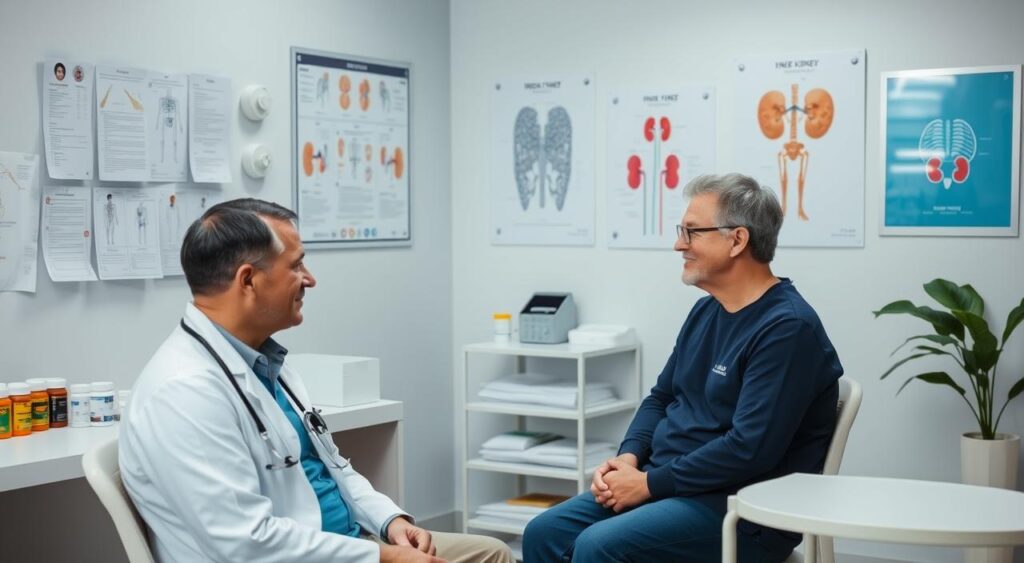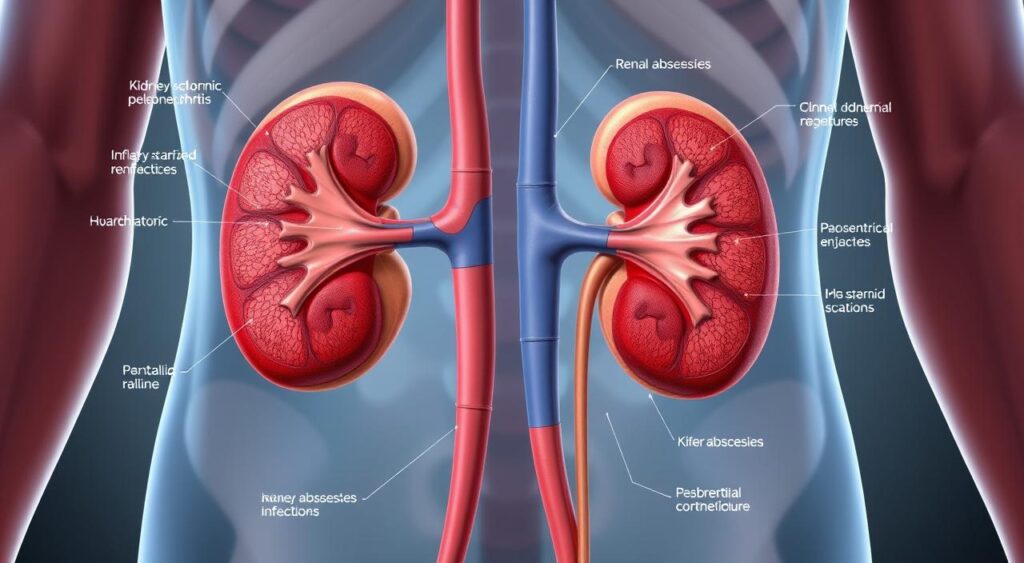A staggering 12% of people will get a kidney infection at some point. Chronic pyelonephritis is a serious and recurring condition. It’s vital to understand this condition for those at risk or already diagnosed.

Chronic pyelonephritis affects the kidneys, causing recurring infections. These infections can lead to scarring and damage. It’s crucial to manage this condition to avoid long-term kidney damage. Learning about chronic pyelonephritis helps individuals protect their kidney health and avoid complications.
Key Takeaways
- Chronic pyelonephritis is a recurring kidney infection that can cause scarring and damage to the kidneys.
- Understanding the basics of chronic pyelonephritis is crucial for individuals who are at risk or have been diagnosed with the condition.
- Chronic pyelonephritis can lead to serious complications if not managed properly.
- Managing chronic pyelonephritis involves preventing recurring kidney infections and reducing the risk of long-term damage to the kidneys.
- Individuals can take control of their kidney health by learning more about chronic pyelonephritis and its management.
- Chronic pyelonephritis is a type of kidney infection that requires proper medical attention and care.
Understanding Chronic Pyelonephritis and Its Impact on Kidney Health
Chronic pyelonephritis is a serious kidney issue. It causes long-term damage and can lead to chronic kidney infection. This condition makes the kidneys scar and lose function over time.
Managing chronic pyelonephritis starts with knowing what it is. Recurrent renal inflammation is a big problem. It can cause chronic kidney infection and more issues. It’s important to know the difference between chronic and acute pyelonephritis. The treatment and outcomes are different.
Definition and Basic Concepts
How Chronic Pyelonephritis Differs from Acute Cases
Chronic pyelonephritis is about ongoing infections. Acute pyelonephritis is a single infection. Chronic pyelonephritis means infections keep coming back.
The Long-term Impact on Kidney Function
Chronic pyelonephritis can badly harm the kidneys. It can cause scarring, reduce function, and increase the risk of kidney failure. If symptoms don’t go away or get worse, see a doctor. Early treatment can prevent more damage and improve results.
| Condition | Definition | Impact on Kidney Function |
|---|---|---|
| Chronic Pyelonephritis | Recurrent renal inflammation leading to chronic kidney infection | Scarring, reduced kidney function, increased risk of kidney failure |
| Acute Pyelonephritis | One-time kidney infection | Typically resolves with treatment, minimal long-term impact |
Common Signs and Symptoms to Watch For
It’s important to know the pyelonephritis symptoms early. People with chronic pyelonephritis might feel flank pain, fever, and changes in how they urinate. These pyelonephritis symptoms can be different in how bad they are and how often they happen.
Some common signs and symptoms of chronic pyelonephritis include:
- Flank pain or tenderness
- Fever and chills
- Changes in urination patterns, such as frequent or painful urination
- Cloudy or bloody urine
- Strong or foul-smelling urine
If you notice any of these pyelonephritis symptoms, see a doctor right away. Early treatment can stop kidney damage. Knowing these signs helps you manage your health better.
Understanding chronic pyelonephritis symptoms helps you take charge of your health. Work with your doctor to find the best treatment. Spotting pyelonephritis symptoms is key to managing your condition and staying healthy.
Risk Factors and Underlying Causes
Chronic pyelonephritis often comes from repeated kidney infections. These infections can be caused by many things. Knowing these causes is key to stopping and managing the condition. A big worry is chronic uti complications, which can seriously harm the kidneys if not treated.
Several things can lead to chronic pyelonephritis. These include problems with the urinary tract, a history of UTIs, and weak immune systems. These factors can make it more likely to get chronic pyelonephritis and chronic uti complications.
- Anatomical abnormalities of the urinary tract
- Previous UTI history
- Compromised immune system factors
These factors can lead to chronic uti complications and raise the risk of chronic pyelonephritis. Knowing these risks helps people take steps to lower their chance of getting the condition.
| Risk Factor | Description |
|---|---|
| Anatomical abnormalities | Abnormalities in the urinary tract, such as kidney stones or blockages, can increase the risk of infection |
| Previous UTI history | A history of UTIs can increase the risk of developing chronic pyelonephritis and chronic uti complications |
| Compromised immune system | A weakened immune system can increase the risk of infection and chronic uti complications |
The Connection Between Recurring UTIs and Chronic Pyelonephritis
Recurring urinary tract infections (UTIs) can lead to long-term pyelonephritis, a serious kidney infection. This happens because UTIs keep causing inflammation in the kidneys. Over time, this can lead to scarring and damage.
Several factors contribute to this connection:
- Persistent bacterial infections
- Delayed or inadequate treatment of UTIs
- Underlying anatomical abnormalities
To prevent long-term pyelonephritis, it’s important to manage UTIs well. This means getting medical help quickly, finishing all antibiotics, and staying clean to avoid more infections.
Knowing how recurring UTIs can lead to long-term pyelonephritis helps us protect our kidneys. We can take steps to lower the risk of this serious condition.
| Factor | Description |
|---|---|
| Persistent bacterial infections | Can cause ongoing inflammation and damage to the kidneys |
| Delayed or inadequate treatment | Can lead to increased risk of complications, including long-term pyelonephritis |
| Underlying anatomical abnormalities | Can increase the risk of UTIs and long-term pyelonephritis |
Diagnostic Procedures and Tests
To diagnose chronic pyelonephritis, doctors use physical exams, lab tests, and imaging studies. These steps help confirm the condition and check the kidney damage. This detailed approach is key to creating a good treatment plan.
The first step is usually a physical exam. Doctors look for signs of kidney inflammation, like tenderness in the lower back or abdomen. They also do a urinalysis to check for blood, protein, or bacteria in the urine.
Laboratory Testing Options
Lab tests, including blood and urine tests, are crucial for confirming the diagnosis and tracking the disease’s progress. These tests help find the cause of kidney inflammation. They guide the treatment plan.
Imaging Studies and Their Importance
Imaging studies like ultrasound or CT scans help doctors see the kidneys and any damage. These studies show the extent of kidney damage. They help in creating a good treatment plan.
Doctors use physical exams, lab tests, and imaging studies together. This way, they get a full picture of the patient’s condition. They can then make an effective treatment plan to manage the disease and prevent more damage.
Medical Treatment Approaches
Chronic pyelonephritis needs a detailed treatment plan to manage the infection and stop it from coming back. Chronic kidney infection management is key to avoid long-term kidney damage. The main aim is to clear the infection with antibiotics and stop it from happening again.
Treatment methods may include:
- Antibiotics to get rid of the infection
- Lifestyle changes to stop it from coming back
- Regular checks to make sure it doesn’t return
Following the treatment plan is very important. It helps make sure the infection is gone for good. It also helps avoid bacteria that don’t respond to antibiotics.

| Treatment Approach | Description |
|---|---|
| Antibiotics | Used to eliminate the infection |
| Lifestyle Modifications | Used to prevent future occurrences |
| Regular Monitoring | Used to ensure the infection does not recur |
Managing Chronic Kidney Inflammation Long-term
Chronic kidney inflammation needs a detailed plan to stop further damage and keep you healthy. This plan includes the right medicines, changes in your lifestyle, and regular check-ups.
Managing chronic kidney inflammation well is key to avoid serious problems and improve your life. It’s important to work with your doctor to create a plan that fits your needs and health.
Medication Management Strategies
Medicines are crucial in controlling chronic kidney inflammation. They aim to reduce inflammation, stop infections, and slow the disease’s growth. Your doctor might give you antibiotics, anti-inflammatory drugs, or other medicines to help.
Lifestyle Modifications
Making lifestyle changes is vital to manage chronic kidney inflammation. These changes include:
- Eating a healthy diet low in salt, sugar, and bad fats
- Drinking lots of water to stay hydrated
- Exercising regularly to boost health and reduce stress
- Getting enough sleep and using stress-reducing methods
Regular Monitoring Requirements
Regular monitoring is essential to manage chronic kidney inflammation well. This means regular visits to your doctor, blood tests, and imaging studies. These help check your kidney’s function and how the disease is progressing.
Prevention Strategies and Self-care Methods
To prevent kidney infection, you need to take care of yourself and follow medical advice. Keeping clean, especially after using the bathroom and before and after sex, is key. Also, safe sex practices can lower the risk of kidney infection.
Drinking cranberry juice might help prevent urinary tract infections (UTIs), which can lead to kidney infection. But, we need more research to be sure. Drinking lots of water also helps by flushing out bacteria from your urinary tract.
- Practice good hygiene, especially after using the bathroom and before and after sex
- Stay hydrated by drinking plenty of water
- Avoid holding urine for long periods
- Avoid using scented soaps or bubble baths
By following these tips and staying clean, you can lower your risk of kidney infection and chronic pyelonephritis. Always talk to a healthcare professional for advice on preventing kidney infection and managing health conditions.
| Prevention Method | Description |
|---|---|
| Good Hygiene | Practicing good hygiene, especially after using the bathroom and before and after sex |
| Stay Hydrated | Drinking plenty of water to flush out bacteria from the urinary tract |
| Avoid Holding Urine | Avoiding holding urine for long periods to prevent bacterial growth |
Complications and When to Seek Emergency Care
Chronic pyelonephritis can lead to serious complications if not managed properly. It’s important to know the risks to get timely medical help. This condition can damage kidneys permanently, leading to chronic kidney disease or failure.
Serious Complications
Some serious complications include sepsis, a life-threatening condition when infection spreads to the blood. Other issues might be kidney failure, needing dialysis or a transplant.
Warning Signs
Recognizing warning signs is crucial. Look out for severe pain in the side or back, fever, chills, or nausea and vomiting. If you see these symptoms, get medical help right away.

Emergency Situations
In emergencies like sepsis or kidney failure, seek medical help immediately. A healthcare professional can provide the right treatment. Understanding the risks and getting help when needed can protect your kidney health.
Living with Chronic Pyelonephritis: Lifestyle Adjustments
Managing chronic pyelonephritis means making big lifestyle changes. This helps fight recurrent renal inflammation. Eating well, drinking plenty of water, and exercising regularly are key. These actions can lessen symptoms and boost your life quality.
Preventing recurrent renal inflammation is crucial. Here’s how to do it:
- Practice good hygiene to stop urinary tract infections
- Drink lots of water to flush out bacteria
- Avoid foods that can upset your kidneys
Also, team up with your doctor to create a treatment plan. This might include medicines for symptoms and regular check-ups. Being proactive can lower the risk of serious problems and keep you healthy.
By adjusting your lifestyle and following your doctor’s advice, you can manage chronic pyelonephritis. This means sticking to healthy habits and keeping an eye on your health over time. The rewards to your health and happiness are huge.
| Lifestyle Adjustment | Benefits |
|---|---|
| Healthy Diet | Reduces symptom frequency and severity |
| Regular Physical Activity | Improves overall health and well-being |
| Staying Hydrated | Helps prevent urinary tract infections |
Supporting Your Kidney Health: Diet and Exercise
For those with chronic kidney infection, a healthy lifestyle is key. This means choosing the right foods and staying active. A balanced diet can help manage symptoms and prevent more damage.
Recommended Dietary Changes
It’s important to cut down on sodium and eat foods full of antioxidants and fiber. Eating less protein and phosphorus also helps the kidneys. Avoid foods high in sugar and fats to protect your kidneys.
Physical Activity Guidelines
Exercise is good for your health and can lower kidney infection risks. Try to do 30 minutes of moderate exercise daily, like walking or cycling. Remember to drink water before, during, and after working out.
Hydration Requirements
Drinking enough water is crucial for kidney health. Aim for 8-10 glasses a day. Stay away from sugary drinks that can harm your kidneys. Simple changes in diet and exercise can greatly benefit your kidney health.
By following these tips and making smart lifestyle choices, you can manage your chronic kidney infection. This helps prevent more kidney damage.
| Dietary Recommendation | Benefit for Kidney Health |
|---|---|
| Low-sodium diet | Reduces blood pressure and strain on kidneys |
| High-fiber diet | Helps regulate blood sugar and cholesterol levels |
| Adequate hydration | Helps flush out toxins and waste products from the body |
Conclusion: Taking Control of Your Kidney Health
Understanding the symptoms and causes of chronic pyelonephritis is key to keeping your kidneys healthy. Recognizing signs like frequent urinary tract infections and kidney inflammation is important. This helps prevent long-term kidney damage.
Working with healthcare professionals is crucial. They can help create a plan to manage chronic pyelonephritis. This plan might include medication, lifestyle changes, and regular check-ups.
Your kidney health is up to you. Stay alert, get medical help quickly, and make choices that help your kidneys. By doing this, you can manage chronic pyelonephritis better. Let’s work together to understand and manage kidney disease better, so everyone can live healthier lives.
FAQ
Q: What is chronic pyelonephritis?
A: Chronic pyelonephritis is a long-term kidney infection. It can cause serious problems if not treated right. It’s often caused by repeated urinary tract infections (UTIs).
Q: How does chronic pyelonephritis differ from acute cases?
A: Chronic pyelonephritis is ongoing and keeps coming back. Acute pyelonephritis is a single, severe infection. Chronic cases cause long-term damage to the kidneys.
Q: What are the long-term effects of chronic pyelonephritis on kidney function?
A: It can scar the kidneys, making them work less well. This can lead to a decline in kidney function. In severe cases, it can cause kidney failure.
Q: What are the common signs and symptoms of chronic pyelonephritis?
A: Symptoms include flank pain, fever, and chills. You might also feel nauseous, vomit, and have trouble urinating. The severity and frequency of these symptoms vary.
Q: What are the risk factors for developing chronic pyelonephritis?
A: Risk factors include urinary tract abnormalities and a history of UTIs. A weakened immune system also increases the risk.
Q: How are chronic pyelonephritis and recurring UTIs connected?
A: Frequent UTIs can lead to chronic pyelonephritis. Managing UTIs is key to preventing chronic kidney damage.
Q: What diagnostic procedures are used to confirm chronic pyelonephritis?
A: Diagnosis involves a physical exam, lab tests, and imaging studies. These help assess kidney inflammation and damage.
Q: What are the common medical treatment approaches for chronic pyelonephritis?
A: Treatment includes antibiotics and medications to manage symptoms. Following the treatment plan is crucial for managing the condition.
Q: How can chronic kidney inflammation be managed long-term?
A: Long-term management includes medication, lifestyle changes, and regular check-ups. These help prevent complications and manage related issues.
Q: What are some strategies for preventing chronic pyelonephritis?
A: Prevention includes good hygiene, safe sex, staying hydrated, and drinking cranberry juice. These may help reduce UTI risk.
Q: What are the potential complications of chronic pyelonephritis, and when should emergency care be sought?
A: Complications include sepsis and kidney failure. Seek emergency care for severe symptoms like high fever and significant changes in condition.
Q: How can individuals adapt their lifestyle to better manage chronic pyelonephritis?
A: Lifestyle changes include managing stress, eating healthy, exercising, and staying hydrated. Support from healthcare providers and a support network is also important.
Q: What dietary and exercise recommendations are important for supporting kidney health with chronic pyelonephritis?
A: Eat less sodium and protein, drink more fluids, and include anti-inflammatory foods. Low-impact exercises support kidney health and manage symptoms.
